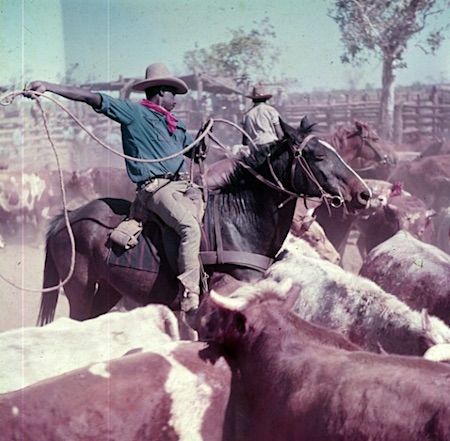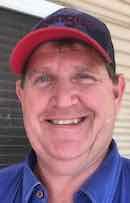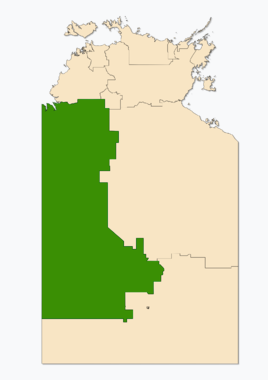Tourism, cattle, mining, oil, gas: The world's your oyster, Stuart.
5 October 2017
 By ERWIN CHLANDA
By ERWIN CHLANDA
There is a sense of disquiet and urgency in the electorate of Stuart, which is bigger than Italy but has an adult population of just 5000.
“Constituents still feel disempowered because of aspects of the Intervention, the shire and regional council Local Government model, and the imposition of a wholly public housing model in remote communities.
“The interesting aspect of this is that while constituents still want equitable service delivery – roads, mobile coverage, police stations – many people are talking about equity of opportunity to participate in the working economy.”
This, of course, means getting off welfare.
“It’s a long road, but it starts with the aspiration, which is clearly present. To deliver, government, industry and community must work together,” says Mr McConnell.
“There is under- or even un-utilised Indigenous labour out there. A number of these people are expressing interest in engaging in the workforce. The equity of opportunity that I often speak of includes education, infrastructure and industry.”
Mr McConnell (Labor) won the seat a year ago in an almost unprecedented swing of 31% from domestic violence activist Bess Price (Country Liberal Party) who in turn had turfed out in 2012 her nephew, Karl Hampton (Labor), whose vote had halved. Mr McConnell holds the Territory’s second safest seat with a 25.4% margin.
The CLP’s Roger Vale held Stuart for nine years from 1974, Labor’s Brian Ede for 13, Labor’s Peter Toyne for 10 and Mr Hampton for six. Stuart has become a seismic place.
 “I’m tired of the electorate of Stuart being looked at through the deficit model,” says Mr McConnell (at right), pointing to “highly productive pastoral enterprises, tourism enterprises, extractive industries such as mines, gas and oil in the electorate”.
“I’m tired of the electorate of Stuart being looked at through the deficit model,” says Mr McConnell (at right), pointing to “highly productive pastoral enterprises, tourism enterprises, extractive industries such as mines, gas and oil in the electorate”.
The Mereenie oil and gas fields are straddling the boundaries between the Stuart and Namatjira electorates.
“What role fracking will have in the NT in the future is a decision yet to be taken by Government.”
“I am, of course, frustrated to see employment and business opportunities in the electorate not being taken up by local people. However, I understand the complexities in this space. Without making excuses, we need collectively to work on the barriers to local workforce utilisation.”
He says pastoral properties that productively supported small groups under private ownership will never be able to sustain much larger Traditional Owner populations.
“This is why innovation is always required. The pastoral industry has changed dramatically, particularly post BTEC.”
It is a long time since the Aboriginal men were ringers, and the mail plane has started to come with the fortnightly government cheques, now called sit-down money.
But Mr McConnell takes the glass-half-full view: “It is an asset that Indigenous people, predominantly men, still aspire to work in the pastoral industry.
 “It is my experience that Indigenous people like to work in workplaces that recognise their intrinsic knowledge and understanding.
“It is my experience that Indigenous people like to work in workplaces that recognise their intrinsic knowledge and understanding.“Being an artist, a ranger, and an interpreter are all good examples.
“Being a ringer is also a good example. I want to do more work over the coming months in this space, trying to further facilitate relationships between Indigenous communities and pastoral enterprises.
“I do sincerely believe that there is a ‘seismic’ change happening in Indigenous communities and people are becoming much more aspirational.
“I will use the knowledge that people want change to put as much constructive pressure on government and others to assist my constituents to fulfil these aspirations.
“The future isn’t written for us,” he says.
Mr McConnell grew up with Aboriginal kids on a remote cattle station: “We were more the same than different,” he says.
Before entering politics he joined a government funded outstation support organisation, Ingkerreke, where he soon became the manager.
He added to it an Aboriginal-owned steel manufacturing company.
He says it is his “sincere belief that the best way to deliver on time, on budget, and to the quality the client requires is competition. There is only one commercial reality. The sooner we realise this is relevant as much across the Indigenous sector, as with most other sectors, the better off we will be.”
Last week the Parliamentary circus was in Alice Springs, with a Caucus meeting (in which he takes part) and a Cabinet meeting (from which as a backbencher he is excluded).
“I am not a member of Cabinet and am never present at Cabinet meetings and am not privy to Cabinet discussion. That is absolutely appropriate,” he says.
So Mr McConnell last week did what he likes best: helping constituents who are stuck in town after the footy grand final to get back to the Western Desert; assisting with sorry camps and other cultural obligations, informing people of their options, resources and assistance available, but also facilitating resilience, self-reliance and planning.
“I do like this aspect of my role. I prefer to develop policy in line with my aspiration – equity of opportunity for my constituents,” he says.
After a bit more than a year in Parliament he says this is what’s taking shape on the path to getting off welfare: “It’s not a matter of changing the hand-out rules. It’s a matter of learning skills and using them.”
• Tourism, including in the West MacDonnell ranges, is potentially huge: Cultural enterprises, 4WD tours run by traditional owners. This already has a foothold in the Kimberleys in WA, “small scale camping with custodians of cultural knowledge, getting to see the world from their perspective”.
• Further development of mountain biking in whose development Mr McConnell played a key role as the manager of Ingkerreke. It sponsored the nascent sport in the immediate vicinity of Alice Springs. Time has come, he says, to expand it to the magnificent surroundings of the town, similar to the Uthah San Juan trail, a course of several hundred kilometres along a string of huts that carry daily essentials and have a bed for contestants to sleep in.
 • Building on the strong base of Indigenous art centres by diverting as much as he can of the government’s planned Art Trail through his electorate, coupling painting trips with light 4WD adventures, and having Alice Springs as a comfortable home base. Events such as Desert Song at Ormiston Gorge would fit well into that, focussing on “land and people”.
• Building on the strong base of Indigenous art centres by diverting as much as he can of the government’s planned Art Trail through his electorate, coupling painting trips with light 4WD adventures, and having Alice Springs as a comfortable home base. Events such as Desert Song at Ormiston Gorge would fit well into that, focussing on “land and people”.
We talked about Alvin Toffler’s 1980s cult book The Third Wave, about leapfrogging social and educational shortcomings through clever technology. Could it change the parlous standard of reading and writing among young people in the bush?
Mr McConnell picks up his mobile phone: “Just three months after young people get one of these their reading improves out of sight. It gives them access to the big, wide world. It’s their access to the internet and particularly Facebook.”
PHOTOS: Top – Aboriginal stockman: “It is an asset that Indigenous people, predominantly men, still aspire to work in the pastoral industry,” says Mr McConnell. (Photo National Library of Australia.) Centre – Map of the electorate of Stuart. ABOVE – Mereenie oilfield.



I agree with all that you say Scott the real question is what are you going to do about it?
You’re the man in the chair.
Over some 63 years of living and working in the bush I came to understand the aspirations of Aboriginal Centralians – especially the kids are just the same as yours and mine.
No-one wants to be left sitting in the bush condemned to an existence somewhat akin to living museum piece, belittled and patronised while being force fed a hopeless going nowhere culture of victimhood, propagated of course by those with vested interest in the status quo!
Yes, Aboriginal people are aspirational! Of course, they are!
That is the driving force behind the ongoing fight for total equality.
It will allow individuals to be able to be the masters of their own destinies to receive reward for their efforts as individuals. It will allow individual ownership and control of homes of land of royalties, just like other Australians!
Equality will allow those who are aspirational and prepared to get off their backsides and work to benefit from their efforts, as opposed to the present system of community ownership, very like the failed Communists systems where those who did want to get ahead were dragged down by those who couldn’t be bothered.
This must change Scott. Break down the stranglehold of the Land Councils, they are parasitic organisations that simply feed bureaucrats while the average Aboriginal person lives and dies a pauper under their rule.
While I understand this will take a long time to achieve we must begin the conversation, show direction give those with aspiration hope something to strive for.
In the meantime, Scott, we have a more urgent problem: Your Labor Government has only been in for a bit more than a year yet we are already seeing the funds sucked back to the North to feed a luxurious lifestyle of Darwinians at the expense of the regions.
GST revenue intended to benefit and advance the lives of all Territorians are once again benefitting those in the capital, while we simply miss out!
Work is running low in the Centre. Love or hate Adam Giles while he was Chief, we saw more even, fairer distribution of revenue under his rule.
So, what are you going to do about that, Scott, Chansey, Dale?
Not much going on down here and we are relying on your voices at the table.
Which kind of brings me to the larger subject the eternal battle of the regions to gain a fair share of revenue, no matter who’s in Government in the North.
I can’t ever see that changing. Centralians are now even weaker with the loss of a seat.
Unless the people of the regions are prepared to put aside party politics and act as a block supporting whichever side they may choose in Government.
Looking back over a chain of failed [from a regional point of view] governments, it is quite clear that the talent pool of experience long term Territorians who understand and can represent the issues is quite small across all parties.
Given that councils made up of members from all kinds of political backgrounds can work it out and perform their role, maybe it’s about time Territorians outside of Darwin considered the establishment of a regional party which puts aside the normal Labor, Liberal divide, and worked jointly to advance the interest of the regions.
Which of course in the end are also the interests of the capital – healthy productive regions, a booming capital.
Budget airlines = Tourists = Job opportunities for all.
The ringer pictured is now a historical relic.
Indigenous people, predominantly men, still aspire to work in a pastoral industry but it largely no longer exists.
The pastoral industry has gone high tech aiming at value adding.
With one cow worth a couple of grand they are worth the effort.
These days the average pastoral worker needs to be computer savy to assess cattle as they go through the crush.
The worker needs to be data savy as each cow is uniquely identified and each stage of its life is recorded.
He needs to be able to pregnancy test, perhaps using an ultrasound.
He will be collecting poo samples for analysis and recording the results in the computer.
He will be familiar with a large number of OHandS and cattle well being rules and regulations.
He will probably have passed a Cert 3 level course.
And at the end of the day he will be paid very little as our stations are staffed almost exclusively with backpacker workers, smart and keen and working for the experience not the money.
Times have changed.
Good on you, Scott.
Representing your constituents is your primary role and you have embraced it with passion, pride and dignity.
Intergenerational passive welfare has been disastrous for the Aboriginal people living in remote areas of Central Australia. Working with the people on ideas to actually create employment opportunities (tourism, housing, roads, infrastructure, renewable energy, sustainable food production etc.) will help.
Land and Regional Councils have a key role in helping to support these initiatives.
They should work better in cohort with the NT and Australian governments to achieve mutually gains.
And it’s not just about government. Bureaucracies and bureaucrats must work better to deliver real outcomes for the people they are supposed to be supporting, not just hanging on to their high salaries.